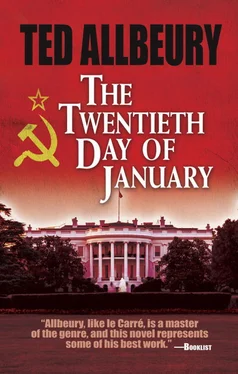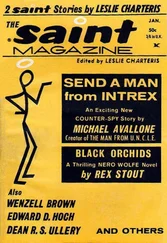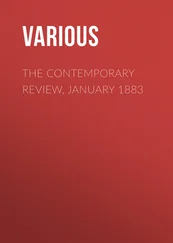“OK. Give her my love.”
“Sure I will. If I see her.”
There was a crowd of reporters waiting in the main hall but the airline staff escorted Powell through to the manager’s office. They were holding the Washington flight, and after a drink he walked across to the plane, accompanied by four security men. Dempsey walked across to the campaign helicopter carrying his own bag.
It was four weeks to Christmas, but the snow was Christmas snow. Drifting slowly past the windows on the thirtieth floor, it lay in big soft cotton wool folds along the window ledges, and was piled up on the balcony, reflecting in pale gold patches the lights inside the apartment. It was so thick that you couldn’t see the Island. You couldn’t even see the East River.
Dempsey sat in his green corduroy jacket, perched on the edge of the polished table, with one long, jeans-clad leg stretched out to keep his balance. As he looked out at the falling snow he slowly sipped a drink and listened to the music. It was Oistrakh playing Khachaturian’s violin concerto off an old Moscow filmtrack. When the music stopped abruptly he slowly turned and looked at the man who stood alongside the tape-recorder.
“They’ll have to give you the Order of Lenin at least, Viktor.”
Kleppe turned, his face impassive as he walked across to the table. He waved to another chair as he sat down.
“There’ll be no medals, my friend. Remember I told them it wasn’t possible. That was your opinion too.”
Dempsey laughed and shrugged. “It wouldn’t have been possible with any other man but Powell, I swear it.”
“He thinks he did it himself ?”
“I wouldn’t say that. He acknowledges helping hands here and there. And when he doesn’t like what he sees he turns a blind eye. You’ve got to remember that he doesn’t know most of what has been done.”
“Is he fully under control?”
“By no means. I can pressure him but I can’t just snap my fingers and make him jump.”
“Moscow assumes that he is under control.”
“Then Moscow should be disabused of that idea. At once.”
“You mean you can’t make him deliver?”
“Sure I can make him deliver; and when I’ve told him the facts of life there’ll be even fewer problems. But it’s not a press-button service. He feels his power, and I don’t want to destroy that. Just programme it.”
“Is there any chance he could renege?”
“No. He’s been sour with ambition from the moment he became State Governor. Every little aspect of presidential privilege and protocol he knows by heart. He can’t wait to get the emperor’s clothes on. Like all the rest of them he’s promised to slash taxes, cut unemployment, and achieve peace on earth. He doesn’t know how he’s going to do it but, by Jesus, he’s gonna do it.” He paused, smiling. “And we’ll show him how.”
Kleppe nodded. “I’m leaving for Moscow tomorrow. I’ll be back next Wednesday. Can you see me that evening?”
“God knows. It’s going to be chaos. Maybe you’ll have to come over to me in Washington or Hartford. And don’t forget we’ll be surrounded by FBI men, White House security, and all the rest of them.”
“D’you want to stay here tonight?”
“No. I promised I’d see Jenny.”
“She’s still got the photographs.”
“I know she has. But I won’t need them, Viktor. I’ve got enough without them.” He laughed softly. “It’s really gonna shake him.”
“Does he still see her?”
“Sometimes. He wanted her to go over tonight. He’s crazy. He uses her like a hooker, but thinks of her place as a sanctuary. I guess he’s fond of her.” He grinned. “Provided he can take her pants off.”
Kleppe shrugged. “It’s a wicked capitalist city, my friend. And I love it.”
Andrew Joseph Dempsey was twenty-nine, slim, about 5 feet 6, and attractive to women who fancied poets with a Byronic air. He wasn’t a poet but he looked like poets are supposed to look. Pale, hollow-cheeked and with fair wavy hair. His aesthetic aura was helped in the eyes of some ladies by his being heir to the Dempsey insurance fortune. But it would be only fair to the younger generation to make the point that with girls up to twenty-five his fortune had small significance. His looks and charm were enough.
Dempsey senior was the son of an Irishman from Skibbereen, who had earned a living gutting fish in New Haven. It had taken him five years of mean living before he had his own business buying and selling fish. And another five before his was the biggest outfit on the coast. People say you can’t go wrong in food because whatever happens people have got to eat. Joe Dempsey and the 1930s proved them wrong. As Joe himself said, “There just weren’t enough Fridays.” The 1930s didn’t bankrupt him, but it had been tough, and so was getting his boy through high school and university.
Joseph Junior had taken the first job he could get and that was as a clerk to an accountant. By the time he was twenty-seven he had his own small insurance business, and by the time he was thirty he was able to look after his old man. People still called him Joe Junior long after his father had died, and not even his friends could say that they really knew him. He was a real businessman, that was for sure, but he dabbled in things that his business circle found odd. He read a lot. History and politics, books about Europe, and different religions. And, as if this part of his life was nothing to do with them, he never talked about these interests. Except to his son, of course. He had talked to him for hours, from the point when the boy’s mother had died, when he was almost eight and a half. And there had been no financial problems in putting his boy through school and university. Nor had there been any pressure on the young man to join the business. In fact there was no pressure for Andrew Joseph Dempsey to work at all. His father was a happy victim of his charm; and even others said that when the boy smiled he looked very like his mother. After a few years painting in Paris he had ended up as part-time art critic on one of New York’s more esoteric magazines, with an occasional contribution to arts shows on TV.
In the New York streets the snow was a grey slush, and as there were no cabs free he walked. A biting wind came off the river as he turned into 42nd Street and it followed him down South Park to 38th.
The porter recognized him and walked over to the elevator to press the button for the penthouse floor. There were eight penthouse flats, and Jenny’s was the one facing the elevator. She paid a little less because of the barely audible noise of the gates opening and shutting. She would have paid extra had it been necessary because her visitors could leave her apartment so easily without being seen.
Dempsey pressed the door-bell of P4 and stood waiting. A couple of minutes later he pressed the bell again and the door opened immediately. Whoever opened it was behind the door and he walked in slowly as the door closed behind him. The girl who stood there, smiling, could have come straight off the cover of Vogue except that she wasn’t flat-chested and she was naked. And her eyes weren’t the eyes of a woman in love, but they were big and blue and friendly.
“Why so long?” he said.
She shrugged. “There was a john on the phone.”
“Business good?”
“Never better. Two conventions in town.”
The telephone rang and he watched her as she walked over to answer it.
“Hello… yes it is… which Joe Taverner is that… from New Haven… yes, sure. What did you want, Frank… well, not tonight I’m afraid, my daddy’s in town… that’d be OK, Frank… that’s right… yes, two hundred bucks… sure you can, anything you want, I’d like that… tomorrow at three then, Frank… you bet. Bye.” She hung up and then took the receiver off the cradle. She stood looking at Dempsey and he looked at her. And finally she said. “Are you gonna stay, Andy?”
Читать дальше












